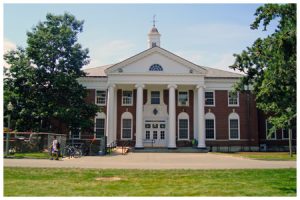
Have you ever wondered how students like my daughter successfully graduate when there is so much to overcome in adjusting to college life. How do they manage their time? How do they study effectively? How do they make life-long friends? How do they choose a career?
At UMass Amherst there is an Office of Undergraduate Student Success which helps with finding resources along those lines. I recently interviewed Kathy Weilerstein, the Director of Residential Academic Programs (RAP), a unit within Student Success Office, and found out many pearls about where the office has come from, the present offerings, and where it is likely to go in the future.
As recent as three years ago, the office was reorganized and reconfigured under the leadership of the Associate Provost, Carolyn Bassett. As I went to the two websites that Ms. Weilerstein directed me to: www.umass.edu/studentsuccess and www.umass.edu/rap, I noticed how thorough and inclusive they were. With well organized and user-friendly tabs to click, depending on if you are a fall semester or spring semester student, a transfer student or a first-generation college student, the websites put forth a feel of thoroughness and care. Tying everything and everyone together, is the promise of student success translating into higher rates of retention and graduation which are goals of the University. In this new structure, the office reports to a dual source: Academic Affairs and the Student Affairs & Campus Life. As new initiatives are established, there is a commitment to working toward a balance with new roles in a thoughtful, interactive, intentional and reflective manner.
What are the key offerings of the Office of Undergraduate Student Success? One is the Residential Academic Programs which gives first semester and transfer students the opportunity to participate in a variety of rewarding academic/social experiences. RAP allows students to quickly become part of the UMass community and helps transition successfully to college life as they live and learn in a common class and residence hall. Almost 50% of new students sign up as they are matched with classes ranging from Introduction to Black Music, to Education and Film, to College Writing-on monsters, for a single semester and a common residence chosen from residential areas such as Northeast, Central, Orchard Hill, Southwest or Commonwealth Honors College for the year. The instructors are passionate and engaging and the class size is small; thirty or less. The popularity of living-learning communities has grown around the country as teaching both academic skills with soft skills such as time management, organization and career choices are becoming more popular. Students are quoted as saying, “It has opened my eyes up to new study habits and gives me a small class experience within the large university.” “I found that the RAP course taught a lot of skills that will be useful in my years here that other classes would never have taught me,” said another student.
Another key offering is the 126-page Student Success Planner. Including the 2019-2020 Academic Calendar, it also provides blank pages for students to fill out A-Week-At-A-Glance as well as monthly calendars showing dates of exams, study periods, vacations and workshop offerings to help manage and prioritize their time to include academic, social, family, financial and well-being priorities. In a “Don’t Let Stress Prevent Success” campaign, the Planner gives all sorts of information such as: how to goal-set and map timelines, how to connect with peer and other mentors, how to connect with professors and career advisors, how to find health and well-being resources as well as other resources including those for students with disabilities or interested in Education Abroad, the Five-College Interchange or the Writing Center. There is even a Success Toolkit – Discover, Learn, Reflect – among which are workshop offerings such as how to be an active learner, what to expect beyond the first year and preparing for final exams. Another new addition, is the tab for “Smart About Money” which is a peer-to-peer financial wellness program where students trained in financial literacy provide personal finance education to help other students manage their financial life at UMass and beyond. The office has also organized workshops for general wellness such as Mindfulness, Meditation and Self-Compassion through the Center for Counseling and Psychological Health as well as peer wellness coaching. Today, with so much work and stress, it is vital that students know their resources to help gain a healthy balance in their lives.
This entire endeavor is a work-in-progress since the office is not yet fully staffed. They are also redoing their website currently; adding to the home page, for example. Two months ago, they hired a website designer and there is a third Director yet to be hired. They are, indeed, ramping up their staff with the expectation of broadening their outreach to include the majority of students across all four years. The idea, according to Ms. Weilerstein, is to inform, not convince. She wants to connect to students in the best possible way. As a previous Special Ed teacher for over twenty years, she has taught at all levels. Now, with over twenty years’ experience at UMass Amherst, she, with the other members of her office are firmly committed to bringing more first-year students into RAP and to bringing the Academic Planner, which had been focused on first-year students, to include all students. This is a tall order, with 2,000 students already participating in RAP and over 23,500 as the total number of undergraduate students.
In short, the Office of Student Success staff are firmly connected and committed, and we thank them for helping all students to be successful at UMass Amherst and to graduate in a timely fashion. My daughter will be one of thousands making it to the graduation finish line next May.
Bronwyn Cooper is the parent of a senior and a member of the UMass Amherst Parents Advisory Council